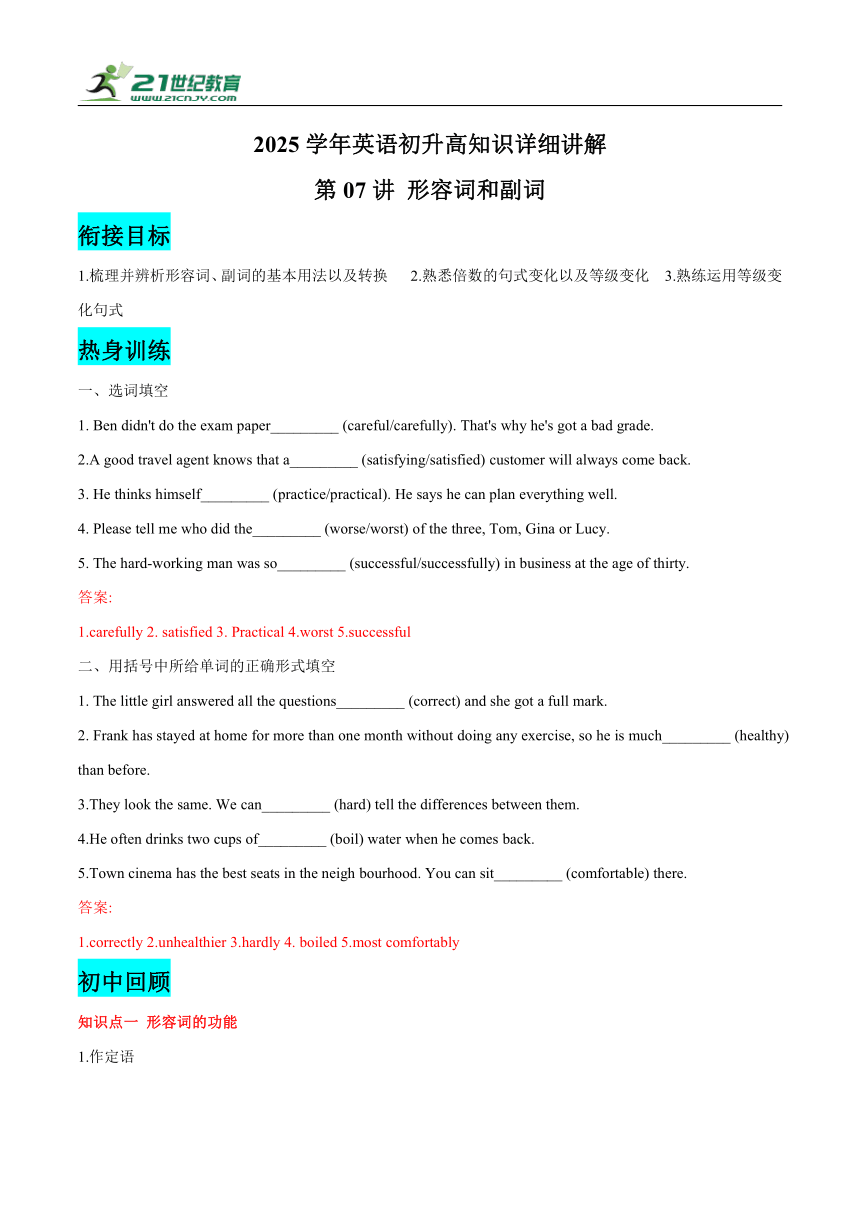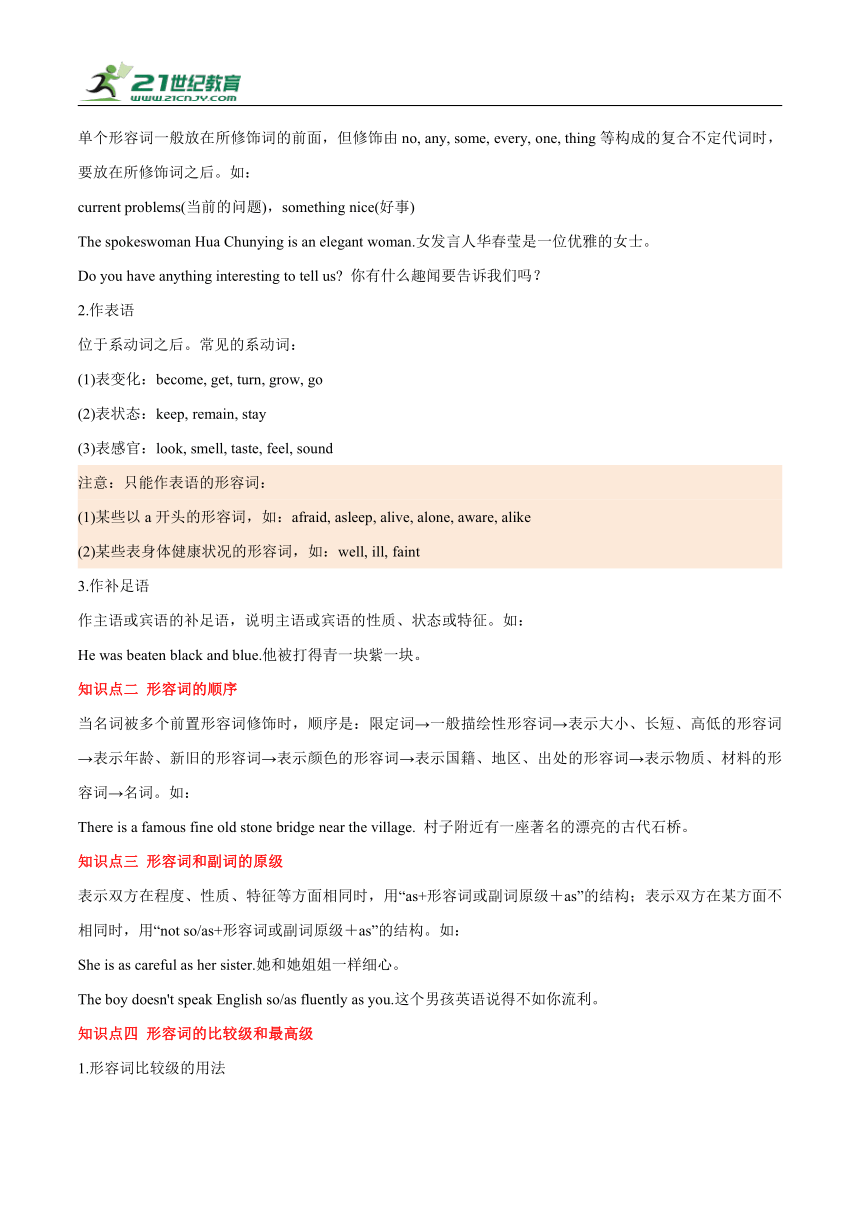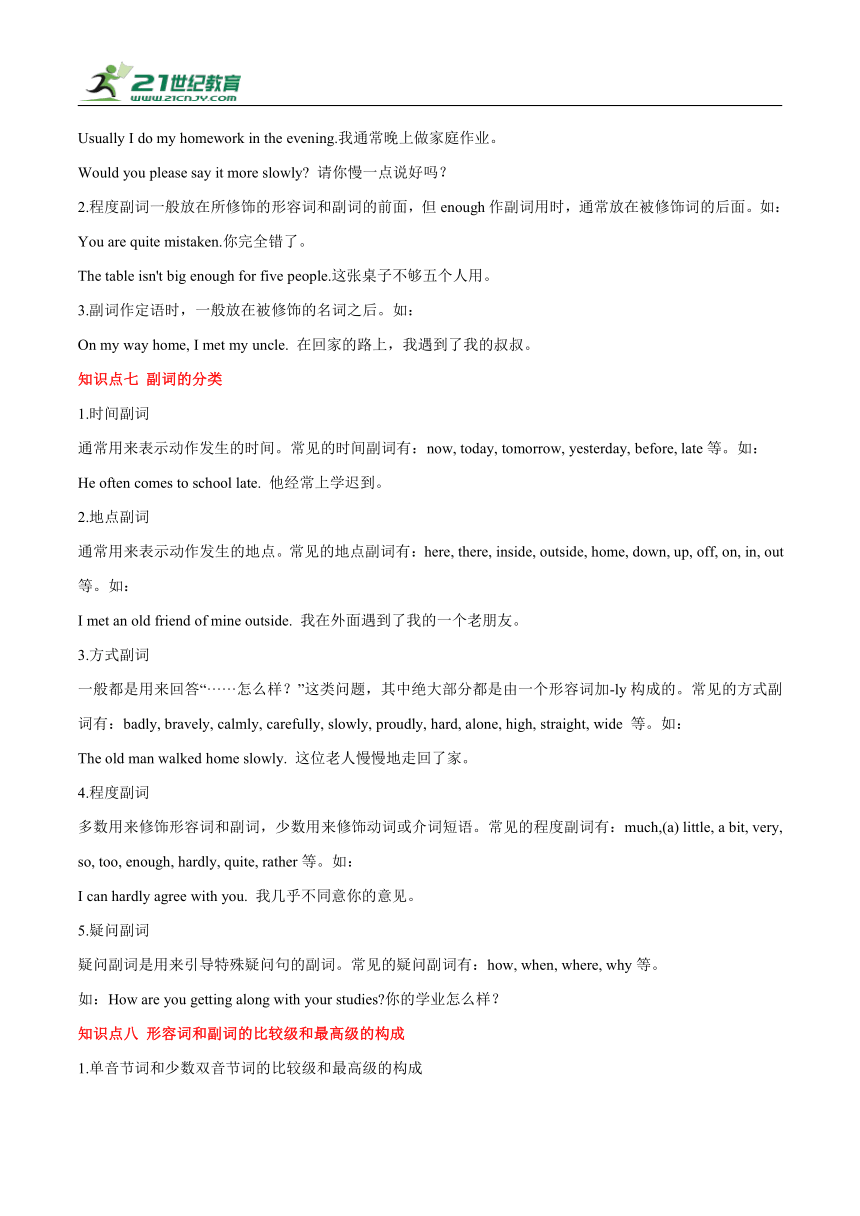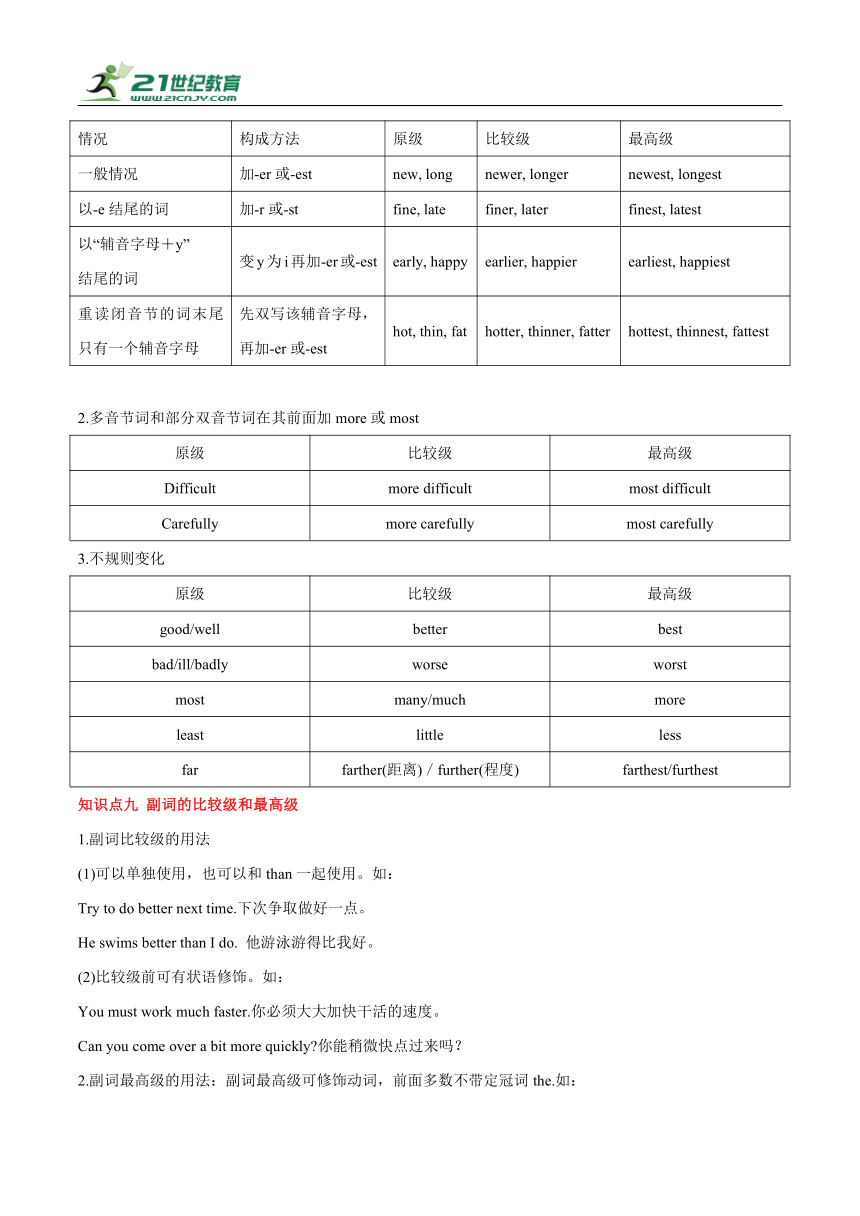第07讲 形容词和副词-2025学年英语初升高知识详细讲解
文档属性
| 名称 | 第07讲 形容词和副词-2025学年英语初升高知识详细讲解 |  | |
| 格式 | docx | ||
| 文件大小 | 71.1KB | ||
| 资源类型 | 试卷 | ||
| 版本资源 | 人教新目标(Go for it)版 | ||
| 科目 | 英语 | ||
| 更新时间 | 2025-06-20 00:34:10 | ||
图片预览





文档简介
2025学年英语初升高知识详细讲解
第07讲 形容词和副词
衔接目标
1.梳理并辨析形容词、副词的基本用法以及转换 2.熟悉倍数的句式变化以及等级变化 3.熟练运用等级变化句式
热身训练
一、选词填空
1. Ben didn't do the exam paper_________ (careful/carefully). That's why he's got a bad grade.
2.A good travel agent knows that a_________ (satisfying/satisfied) customer will always come back.
3. He thinks himself_________ (practice/practical). He says he can plan everything well.
4. Please tell me who did the_________ (worse/worst) of the three, Tom, Gina or Lucy.
5. The hard-working man was so_________ (successful/successfully) in business at the age of thirty.
答案:
1.carefully 2. satisfied 3. Practical 4.worst 5.successful
二、用括号中所给单词的正确形式填空
1. The little girl answered all the questions_________ (correct) and she got a full mark.
2. Frank has stayed at home for more than one month without doing any exercise, so he is much_________ (healthy) than before.
3.They look the same. We can_________ (hard) tell the differences between them.
4.He often drinks two cups of_________ (boil) water when he comes back.
5.Town cinema has the best seats in the neigh bourhood. You can sit_________ (comfortable) there.
答案:
1.correctly 2.unhealthier 3.hardly 4. boiled 5.most comfortably
初中回顾
知识点一 形容词的功能
1.作定语
单个形容词一般放在所修饰词的前面,但修饰由no, any, some, every, one, thing等构成的复合不定代词时,要放在所修饰词之后。如:
current problems(当前的问题),something nice(好事)
The spokeswoman Hua Chunying is an elegant woman.女发言人华春莹是一位优雅的女士。
Do you have anything interesting to tell us 你有什么趣闻要告诉我们吗?
2.作表语
位于系动词之后。常见的系动词:
(1)表变化:become, get, turn, grow, go
(2)表状态:keep, remain, stay
(3)表感官:look, smell, taste, feel, sound
注意:只能作表语的形容词:
(1)某些以a开头的形容词,如:afraid, asleep, alive, alone, aware, alike
(2)某些表身体健康状况的形容词,如:well, ill, faint
3.作补足语
作主语或宾语的补足语,说明主语或宾语的性质、状态或特征。如:
He was beaten black and blue.他被打得青一块紫一块。
知识点二 形容词的顺序
当名词被多个前置形容词修饰时,顺序是:限定词→一般描绘性形容词→表示大小、长短、高低的形容词→表示年龄、新旧的形容词→表示颜色的形容词→表示国籍、地区、出处的形容词→表示物质、材料的形容词→名词。如:
There is a famous fine old stone bridge near the village. 村子附近有一座著名的漂亮的古代石桥。
知识点三 形容词和副词的原级
表示双方在程度、性质、特征等方面相同时,用“as+形容词或副词原级+as”的结构;表示双方在某方面不相同时,用“not so/as+形容词或副词原级+as”的结构。如:
She is as careful as her sister.她和她姐姐一样细心。
The boy doesn't speak English so/as fluently as you.这个男孩英语说得不如你流利。
知识点四 形容词的比较级和最高级
1.形容词比较级的用法
(1)形容词的比较级可以单独使用,也可以和than连用,表示两者相比。如:
Be more careful next time. 下次更小心点儿。
Skiing is more exciting than skating. 滑雪比滑冰更令人激动。
(2)形容词比较级的修饰语:形容词比较级前可加much, any, a bit, a little之类表示程度的状语。如:
He's feeling much better today.他今天感觉好多了。
(3)比较级的特殊用法
比较级+and+比较级/more and more+原级 越来越·····;the+比较级…,the+比较级…越·····,就越······
It rained more and more heavily. 雨下得越来越大了。
The more I work, the more I accomplish. 我劳动得越多,完成得就越多。
2.形容词最高级的用法
(1)the+最高级+比较范围。如:
The Sahara is the biggest desert in the world. 撒哈拉沙漠是世界上最大的沙漠。
注意:形容词最高级前通常必须用定冠词 the.如:
Africa is the second largest continent.非洲是第二大洲。
(2)最高级的意义有时可以用比较级表示出来。如:
Mike is the most careful student in his class.
=Mike is more careful than any other student in his class. 迈克是他班里最细心的学生。
知识点五 副词的功能
1.修饰动词
Experienced teachers are badly needed in this area.该地区急需有经验的老师。
2.修饰形容词
My staying here is extremely enjoyable. 我待在这里很愉快。
3.修饰其他副词
After graduation, he works very hard. 毕业后,他工作非常努力。
4.修饰整个句子
Sadly, they were driven out of their country by the invaders.令人伤心的是,他们被侵略者赶出了自己的国家。
知识点六 副词的位置
1.副词修饰动词时,通常可以放在句首、句中或句末。如:
Usually I do my homework in the evening.我通常晚上做家庭作业。
Would you please say it more slowly 请你慢一点说好吗?
2.程度副词一般放在所修饰的形容词和副词的前面,但enough作副词用时,通常放在被修饰词的后面。如:
You are quite mistaken.你完全错了。
The table isn't big enough for five people.这张桌子不够五个人用。
3.副词作定语时,一般放在被修饰的名词之后。如:
On my way home, I met my uncle. 在回家的路上,我遇到了我的叔叔。
知识点七 副词的分类
1.时间副词
通常用来表示动作发生的时间。常见的时间副词有:now, today, tomorrow, yesterday, before, late等。如:
He often comes to school late. 他经常上学迟到。
2.地点副词
通常用来表示动作发生的地点。常见的地点副词有:here, there, inside, outside, home, down, up, off, on, in, out等。如:
I met an old friend of mine outside. 我在外面遇到了我的一个老朋友。
3.方式副词
一般都是用来回答“······怎么样?”这类问题,其中绝大部分都是由一个形容词加-ly构成的。常见的方式副词有:badly, bravely, calmly, carefully, slowly, proudly, hard, alone, high, straight, wide 等。如:
The old man walked home slowly. 这位老人慢慢地走回了家。
4.程度副词
多数用来修饰形容词和副词,少数用来修饰动词或介词短语。常见的程度副词有:much,(a) little, a bit, very, so, too, enough, hardly, quite, rather等。如:
I can hardly agree with you. 我几乎不同意你的意见。
5.疑问副词
疑问副词是用来引导特殊疑问句的副词。常见的疑问副词有:how, when, where, why等。
如:How are you getting along with your studies 你的学业怎么样?
知识点八 形容词和副词的比较级和最高级的构成
1.单音节词和少数双音节词的比较级和最高级的构成
情况 构成方法 原级 比较级 最高级
一般情况 加-er或-est new, long newer, longer newest, longest
以-e结尾的词 加-r或-st fine, late finer, later finest, latest
以“辅音字母+y” 结尾的词 变y为i再加-er或-est early, happy earlier, happier earliest, happiest
重读闭音节的词末尾只有一个辅音字母 先双写该辅音字母,再加-er或-est hot, thin, fat hotter, thinner, fatter hottest, thinnest, fattest
2.多音节词和部分双音节词在其前面加more或most
原级 比较级 最高级
Difficult more difficult most difficult
Carefully more carefully most carefully
3.不规则变化
原级 比较级 最高级
good/well better best
bad/ill/badly worse worst
most many/much more
least little less
far farther(距离)/further(程度) farthest/furthest
知识点九 副词的比较级和最高级
1.副词比较级的用法
(1)可以单独使用,也可以和than一起使用。如:
Try to do better next time.下次争取做好一点。
He swims better than I do. 他游泳游得比我好。
(2)比较级前可有状语修饰。如:
You must work much faster.你必须大大加快干活的速度。
Can you come over a bit more quickly 你能稍微快点过来吗?
2.副词最高级的用法:副词最高级可修饰动词,前面多数不带定冠词the.如:
He who laughs last laughs best.(谚语)谁笑到最后,谁笑得最好。
Of the four of us, I sang(the)worst. 我们四人中我唱得最差。
高中新知
衔接点一 形容词的功能变化
1.有些形容词作表语时主语不能指人。如:(in)convenient, difficult, necessary等。
2.以-ly结尾的形容词。如:friendly, lovely, lively, lonely, elderly, deadly等。
3.仅作定语的形容词。如:little, many, live, only, elder等。
衔接点二 形容词变副词的规则
1.大部分形容词词尾加-ly
2.辅音+y结尾的变y为i,再加-ly
3.辅音+le结尾的变e为y
4.以-ic结尾的先接al,再加-ly
5.以-11结尾的只需加-y
6.特殊词true-truly, whole-wholly
But not surprisingly, they end up in prison. 他们最终入狱,这并不令人奇怪。
Basically, you can decide what to do at this moment. 基本上,你现在能决定你要做的事情。
衔接点三 冠词和形容词连用的句型
1.the+形容词原级,指一类人或物。
the old/poor/rich/disabled 老年人/穷人/富人/残疾人
2.the+形容词比较级,指两者中“较······的”那一个。
the younger of the two 两人中较年轻的那一个
3.“a/an+形容词比较级”作定语,修饰后面的名词或代词。
The pen is expensive. I want a cheaper one. 这支钢笔很贵。我想要一支便宜点的。
4. a+most+形容词原级,表示“非常······”。
a most beautiful city 一座非常美丽的城市
衔接点四 同义形容词、副词比较
1.very和much的区别
(1)可分等级的形容词和副词前使用very不用much.
(2)表示状态的分词形容词前用very.如 a very frightened boy, a very tired child, a very complicated problem. 一般情况下,-ed结尾的形容词多用much, very much/greatly等修饰。
(3)已转化为形容词的现在分词前用very.如:very interesting/worrying/exciting.
(4)too 前用 much, a lot 或 far,不用 very.如:You are much/far/a lot too nice.另外,在too many/much, too few/little前可用far.
(5)关于原级形容词要记住下列固定的修饰结构:
①修饰“绝对”意义的形容词,一般不用very,而用quite, completely, well, entirely.如:quite wrong(mistaken, sure),completely dead, quite impossible, quite perfect等。
②修饰以a-开头的形容词,多用特殊的修饰词:quite alone, fast asleep, very much afraid.
③一些特殊形容词的修饰语有:be well worth, much the same, freezing cold, quite different.
2.so...that...与such...that...的区别
so+形容词/副词+that…
so+形容词+a(n)+可数名词单数+that...
so+ many/few+复数名词+that...
so+ much/little(少)+不可数名词+that...
such+ a(n) +形容词+可数名词单数+that...
such+形容词+不可数名词+that...
such+形容词+复数名词+that...
注意:下列结构中只能用so不可用such:当名词前有many, much, little, few等表示“多、少”的词修饰时,如 so much progress, so many people, so little food, so few apples等。但当little表示“小”时用 such.如:These are such little boys that they can't dress themselves.下列短语中so的用法是错误的:so a difficult problem, so difficult problems, so hot weather.
衔接点五 倍数表达法
常见的倍数句型主要有:
1. A is+倍数+比较级+than+B
2. A is+倍数+as+原级+as+B
3.Ais+倍数+the+名词(size, length, height等)+of+B
4....of+Ais+倍数+that+of+B
5. A is+倍数+what引导的名词性从句
Peter's jacket looked just the same as Jack's, but it cost twice as much as his.
彼得的夹克衫看起来与杰克的一样,但是价钱却是他的夹克衫的两倍。
衔接点六 比较级的特殊用法
1.“比较级+and+比较级”和“more and more+原级”表示“越来越·..”,其反义词组为““less and less+原级”。如:
In many ways my disability has made me grow more and more independent.
在许多方面,我的残疾已使我越来越独立。
2.“the+比较级…the+比较级…”表示“越······,就越······”。如:
The more upset I got, the less I was able to concentrate.我越是沮丧,就越难以集中精力。
3.“more+原级+than+原级”表示“与其说······不如说······”。如:
The girl was more frightened than hurt.与其说这个女孩受伤了,不如说她吓坏了。
4.“more than+主语+can+谓语”表示“非······所能;······不能”。如:
The beauty of the city is more than I can describe.这座城市的美不是我所能描述的。
5.形容词比较级前一般不用冠词,但如果出现表示范围的短语时,就需要加定冠词。如:
Of the two sisters, Mary is the cleverer.玛丽是两姐妹中较聪明的一个。
衔接点七 比较级表示最高级
1.在某个特定范围内,同类事物对比,可用以下比较级结构表示最高级含义:
China is the largest country in Asia. That is, it is larger than any other country in Asia.
中国是亚洲最大的国家。也就是说,中国比亚洲其他任何国家都大。
2.never+...+a+形容词比较级+单数名词/nothing+...+形容词比较级+than+the+单数名词
I have never heard a better voice./Nothing is better than the voice.这是我听过的最美妙的声音。
注意:以下形容词及其副词无比较级和最高级:relative, perfect, entire, senior, golden, afraid, unique, present, right, wrong, sure, round, empty等。
衔接点八 意义有别的同根副词
close 接近地 closely 紧密地 hard努力地 hardly几乎不
late晚;迟 lately近来 wide充分地 widely广泛地
high高,在高处 highly很;非常 deep深深地 deeply很;强烈地
巩固训练
一、在空白处填入适当的内容或括号内单词的正确形式
A组(词性转换)
1.The_________ (tradition) breakfast in this area includes bread, milk and eggs.
2.The war made millions of people_________ (home).
3. Our holidays in Thailand were really_________ (enjoy) and unforgettable.
4.The little girl was so_________ (frighten) when she saw the traffic accident.
5. Such problems between the two countries should be dealt with_________ (peace).
答案:
1.traditional 2.homeless 3.enjoyable 4.frightened 5. peacefully
B组(形容词和副词的比较等级)
1.The deliveryman's(快递员的)job is normal but necessary. They always send things to people as_________ (quick) as possible.
2.I want the_________ (late) news of all.
3.What is_________ (powerful) animal of all in the forest
4.The_________ he read the book, the more interested he got in it.
5. How beautifully she sings! I have never heard a_________ (good) voice.
答案:
1.quickly 2.latest 3. the most powerful 4.more 5.better
二、按要求改写句子
1.The road is five times as long as that one.(同义句改写)
→The road is five times_________ _________ _________ that one.
→The road is_________ _________ _________ than that one.
2.This building is three times as high as that one.(同义句改写)
→This building is_________ _________ than that one.
→This building is_________ _________ _________ _________ _________ that one.
3. I like the Chinese New Year better than any other festival.(同义句改写)
→I like the Chinese New Year better than_________ _________ _________.
→I like the Chinese New Year better than_________ _________ _________ _________ _________.
答案:
1.the length of; four times longer
2.twice higher; three times the height of
3. the other festivals; any of the other festivals
第07讲 形容词和副词
衔接目标
1.梳理并辨析形容词、副词的基本用法以及转换 2.熟悉倍数的句式变化以及等级变化 3.熟练运用等级变化句式
热身训练
一、选词填空
1. Ben didn't do the exam paper_________ (careful/carefully). That's why he's got a bad grade.
2.A good travel agent knows that a_________ (satisfying/satisfied) customer will always come back.
3. He thinks himself_________ (practice/practical). He says he can plan everything well.
4. Please tell me who did the_________ (worse/worst) of the three, Tom, Gina or Lucy.
5. The hard-working man was so_________ (successful/successfully) in business at the age of thirty.
答案:
1.carefully 2. satisfied 3. Practical 4.worst 5.successful
二、用括号中所给单词的正确形式填空
1. The little girl answered all the questions_________ (correct) and she got a full mark.
2. Frank has stayed at home for more than one month without doing any exercise, so he is much_________ (healthy) than before.
3.They look the same. We can_________ (hard) tell the differences between them.
4.He often drinks two cups of_________ (boil) water when he comes back.
5.Town cinema has the best seats in the neigh bourhood. You can sit_________ (comfortable) there.
答案:
1.correctly 2.unhealthier 3.hardly 4. boiled 5.most comfortably
初中回顾
知识点一 形容词的功能
1.作定语
单个形容词一般放在所修饰词的前面,但修饰由no, any, some, every, one, thing等构成的复合不定代词时,要放在所修饰词之后。如:
current problems(当前的问题),something nice(好事)
The spokeswoman Hua Chunying is an elegant woman.女发言人华春莹是一位优雅的女士。
Do you have anything interesting to tell us 你有什么趣闻要告诉我们吗?
2.作表语
位于系动词之后。常见的系动词:
(1)表变化:become, get, turn, grow, go
(2)表状态:keep, remain, stay
(3)表感官:look, smell, taste, feel, sound
注意:只能作表语的形容词:
(1)某些以a开头的形容词,如:afraid, asleep, alive, alone, aware, alike
(2)某些表身体健康状况的形容词,如:well, ill, faint
3.作补足语
作主语或宾语的补足语,说明主语或宾语的性质、状态或特征。如:
He was beaten black and blue.他被打得青一块紫一块。
知识点二 形容词的顺序
当名词被多个前置形容词修饰时,顺序是:限定词→一般描绘性形容词→表示大小、长短、高低的形容词→表示年龄、新旧的形容词→表示颜色的形容词→表示国籍、地区、出处的形容词→表示物质、材料的形容词→名词。如:
There is a famous fine old stone bridge near the village. 村子附近有一座著名的漂亮的古代石桥。
知识点三 形容词和副词的原级
表示双方在程度、性质、特征等方面相同时,用“as+形容词或副词原级+as”的结构;表示双方在某方面不相同时,用“not so/as+形容词或副词原级+as”的结构。如:
She is as careful as her sister.她和她姐姐一样细心。
The boy doesn't speak English so/as fluently as you.这个男孩英语说得不如你流利。
知识点四 形容词的比较级和最高级
1.形容词比较级的用法
(1)形容词的比较级可以单独使用,也可以和than连用,表示两者相比。如:
Be more careful next time. 下次更小心点儿。
Skiing is more exciting than skating. 滑雪比滑冰更令人激动。
(2)形容词比较级的修饰语:形容词比较级前可加much, any, a bit, a little之类表示程度的状语。如:
He's feeling much better today.他今天感觉好多了。
(3)比较级的特殊用法
比较级+and+比较级/more and more+原级 越来越·····;the+比较级…,the+比较级…越·····,就越······
It rained more and more heavily. 雨下得越来越大了。
The more I work, the more I accomplish. 我劳动得越多,完成得就越多。
2.形容词最高级的用法
(1)the+最高级+比较范围。如:
The Sahara is the biggest desert in the world. 撒哈拉沙漠是世界上最大的沙漠。
注意:形容词最高级前通常必须用定冠词 the.如:
Africa is the second largest continent.非洲是第二大洲。
(2)最高级的意义有时可以用比较级表示出来。如:
Mike is the most careful student in his class.
=Mike is more careful than any other student in his class. 迈克是他班里最细心的学生。
知识点五 副词的功能
1.修饰动词
Experienced teachers are badly needed in this area.该地区急需有经验的老师。
2.修饰形容词
My staying here is extremely enjoyable. 我待在这里很愉快。
3.修饰其他副词
After graduation, he works very hard. 毕业后,他工作非常努力。
4.修饰整个句子
Sadly, they were driven out of their country by the invaders.令人伤心的是,他们被侵略者赶出了自己的国家。
知识点六 副词的位置
1.副词修饰动词时,通常可以放在句首、句中或句末。如:
Usually I do my homework in the evening.我通常晚上做家庭作业。
Would you please say it more slowly 请你慢一点说好吗?
2.程度副词一般放在所修饰的形容词和副词的前面,但enough作副词用时,通常放在被修饰词的后面。如:
You are quite mistaken.你完全错了。
The table isn't big enough for five people.这张桌子不够五个人用。
3.副词作定语时,一般放在被修饰的名词之后。如:
On my way home, I met my uncle. 在回家的路上,我遇到了我的叔叔。
知识点七 副词的分类
1.时间副词
通常用来表示动作发生的时间。常见的时间副词有:now, today, tomorrow, yesterday, before, late等。如:
He often comes to school late. 他经常上学迟到。
2.地点副词
通常用来表示动作发生的地点。常见的地点副词有:here, there, inside, outside, home, down, up, off, on, in, out等。如:
I met an old friend of mine outside. 我在外面遇到了我的一个老朋友。
3.方式副词
一般都是用来回答“······怎么样?”这类问题,其中绝大部分都是由一个形容词加-ly构成的。常见的方式副词有:badly, bravely, calmly, carefully, slowly, proudly, hard, alone, high, straight, wide 等。如:
The old man walked home slowly. 这位老人慢慢地走回了家。
4.程度副词
多数用来修饰形容词和副词,少数用来修饰动词或介词短语。常见的程度副词有:much,(a) little, a bit, very, so, too, enough, hardly, quite, rather等。如:
I can hardly agree with you. 我几乎不同意你的意见。
5.疑问副词
疑问副词是用来引导特殊疑问句的副词。常见的疑问副词有:how, when, where, why等。
如:How are you getting along with your studies 你的学业怎么样?
知识点八 形容词和副词的比较级和最高级的构成
1.单音节词和少数双音节词的比较级和最高级的构成
情况 构成方法 原级 比较级 最高级
一般情况 加-er或-est new, long newer, longer newest, longest
以-e结尾的词 加-r或-st fine, late finer, later finest, latest
以“辅音字母+y” 结尾的词 变y为i再加-er或-est early, happy earlier, happier earliest, happiest
重读闭音节的词末尾只有一个辅音字母 先双写该辅音字母,再加-er或-est hot, thin, fat hotter, thinner, fatter hottest, thinnest, fattest
2.多音节词和部分双音节词在其前面加more或most
原级 比较级 最高级
Difficult more difficult most difficult
Carefully more carefully most carefully
3.不规则变化
原级 比较级 最高级
good/well better best
bad/ill/badly worse worst
most many/much more
least little less
far farther(距离)/further(程度) farthest/furthest
知识点九 副词的比较级和最高级
1.副词比较级的用法
(1)可以单独使用,也可以和than一起使用。如:
Try to do better next time.下次争取做好一点。
He swims better than I do. 他游泳游得比我好。
(2)比较级前可有状语修饰。如:
You must work much faster.你必须大大加快干活的速度。
Can you come over a bit more quickly 你能稍微快点过来吗?
2.副词最高级的用法:副词最高级可修饰动词,前面多数不带定冠词the.如:
He who laughs last laughs best.(谚语)谁笑到最后,谁笑得最好。
Of the four of us, I sang(the)worst. 我们四人中我唱得最差。
高中新知
衔接点一 形容词的功能变化
1.有些形容词作表语时主语不能指人。如:(in)convenient, difficult, necessary等。
2.以-ly结尾的形容词。如:friendly, lovely, lively, lonely, elderly, deadly等。
3.仅作定语的形容词。如:little, many, live, only, elder等。
衔接点二 形容词变副词的规则
1.大部分形容词词尾加-ly
2.辅音+y结尾的变y为i,再加-ly
3.辅音+le结尾的变e为y
4.以-ic结尾的先接al,再加-ly
5.以-11结尾的只需加-y
6.特殊词true-truly, whole-wholly
But not surprisingly, they end up in prison. 他们最终入狱,这并不令人奇怪。
Basically, you can decide what to do at this moment. 基本上,你现在能决定你要做的事情。
衔接点三 冠词和形容词连用的句型
1.the+形容词原级,指一类人或物。
the old/poor/rich/disabled 老年人/穷人/富人/残疾人
2.the+形容词比较级,指两者中“较······的”那一个。
the younger of the two 两人中较年轻的那一个
3.“a/an+形容词比较级”作定语,修饰后面的名词或代词。
The pen is expensive. I want a cheaper one. 这支钢笔很贵。我想要一支便宜点的。
4. a+most+形容词原级,表示“非常······”。
a most beautiful city 一座非常美丽的城市
衔接点四 同义形容词、副词比较
1.very和much的区别
(1)可分等级的形容词和副词前使用very不用much.
(2)表示状态的分词形容词前用very.如 a very frightened boy, a very tired child, a very complicated problem. 一般情况下,-ed结尾的形容词多用much, very much/greatly等修饰。
(3)已转化为形容词的现在分词前用very.如:very interesting/worrying/exciting.
(4)too 前用 much, a lot 或 far,不用 very.如:You are much/far/a lot too nice.另外,在too many/much, too few/little前可用far.
(5)关于原级形容词要记住下列固定的修饰结构:
①修饰“绝对”意义的形容词,一般不用very,而用quite, completely, well, entirely.如:quite wrong(mistaken, sure),completely dead, quite impossible, quite perfect等。
②修饰以a-开头的形容词,多用特殊的修饰词:quite alone, fast asleep, very much afraid.
③一些特殊形容词的修饰语有:be well worth, much the same, freezing cold, quite different.
2.so...that...与such...that...的区别
so+形容词/副词+that…
so+形容词+a(n)+可数名词单数+that...
so+ many/few+复数名词+that...
so+ much/little(少)+不可数名词+that...
such+ a(n) +形容词+可数名词单数+that...
such+形容词+不可数名词+that...
such+形容词+复数名词+that...
注意:下列结构中只能用so不可用such:当名词前有many, much, little, few等表示“多、少”的词修饰时,如 so much progress, so many people, so little food, so few apples等。但当little表示“小”时用 such.如:These are such little boys that they can't dress themselves.下列短语中so的用法是错误的:so a difficult problem, so difficult problems, so hot weather.
衔接点五 倍数表达法
常见的倍数句型主要有:
1. A is+倍数+比较级+than+B
2. A is+倍数+as+原级+as+B
3.Ais+倍数+the+名词(size, length, height等)+of+B
4....of+Ais+倍数+that+of+B
5. A is+倍数+what引导的名词性从句
Peter's jacket looked just the same as Jack's, but it cost twice as much as his.
彼得的夹克衫看起来与杰克的一样,但是价钱却是他的夹克衫的两倍。
衔接点六 比较级的特殊用法
1.“比较级+and+比较级”和“more and more+原级”表示“越来越·..”,其反义词组为““less and less+原级”。如:
In many ways my disability has made me grow more and more independent.
在许多方面,我的残疾已使我越来越独立。
2.“the+比较级…the+比较级…”表示“越······,就越······”。如:
The more upset I got, the less I was able to concentrate.我越是沮丧,就越难以集中精力。
3.“more+原级+than+原级”表示“与其说······不如说······”。如:
The girl was more frightened than hurt.与其说这个女孩受伤了,不如说她吓坏了。
4.“more than+主语+can+谓语”表示“非······所能;······不能”。如:
The beauty of the city is more than I can describe.这座城市的美不是我所能描述的。
5.形容词比较级前一般不用冠词,但如果出现表示范围的短语时,就需要加定冠词。如:
Of the two sisters, Mary is the cleverer.玛丽是两姐妹中较聪明的一个。
衔接点七 比较级表示最高级
1.在某个特定范围内,同类事物对比,可用以下比较级结构表示最高级含义:
China is the largest country in Asia. That is, it is larger than any other country in Asia.
中国是亚洲最大的国家。也就是说,中国比亚洲其他任何国家都大。
2.never+...+a+形容词比较级+单数名词/nothing+...+形容词比较级+than+the+单数名词
I have never heard a better voice./Nothing is better than the voice.这是我听过的最美妙的声音。
注意:以下形容词及其副词无比较级和最高级:relative, perfect, entire, senior, golden, afraid, unique, present, right, wrong, sure, round, empty等。
衔接点八 意义有别的同根副词
close 接近地 closely 紧密地 hard努力地 hardly几乎不
late晚;迟 lately近来 wide充分地 widely广泛地
high高,在高处 highly很;非常 deep深深地 deeply很;强烈地
巩固训练
一、在空白处填入适当的内容或括号内单词的正确形式
A组(词性转换)
1.The_________ (tradition) breakfast in this area includes bread, milk and eggs.
2.The war made millions of people_________ (home).
3. Our holidays in Thailand were really_________ (enjoy) and unforgettable.
4.The little girl was so_________ (frighten) when she saw the traffic accident.
5. Such problems between the two countries should be dealt with_________ (peace).
答案:
1.traditional 2.homeless 3.enjoyable 4.frightened 5. peacefully
B组(形容词和副词的比较等级)
1.The deliveryman's(快递员的)job is normal but necessary. They always send things to people as_________ (quick) as possible.
2.I want the_________ (late) news of all.
3.What is_________ (powerful) animal of all in the forest
4.The_________ he read the book, the more interested he got in it.
5. How beautifully she sings! I have never heard a_________ (good) voice.
答案:
1.quickly 2.latest 3. the most powerful 4.more 5.better
二、按要求改写句子
1.The road is five times as long as that one.(同义句改写)
→The road is five times_________ _________ _________ that one.
→The road is_________ _________ _________ than that one.
2.This building is three times as high as that one.(同义句改写)
→This building is_________ _________ than that one.
→This building is_________ _________ _________ _________ _________ that one.
3. I like the Chinese New Year better than any other festival.(同义句改写)
→I like the Chinese New Year better than_________ _________ _________.
→I like the Chinese New Year better than_________ _________ _________ _________ _________.
答案:
1.the length of; four times longer
2.twice higher; three times the height of
3. the other festivals; any of the other festivals
同课章节目录
